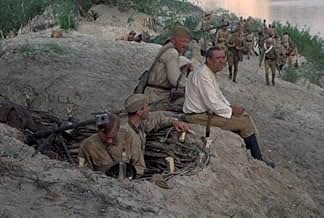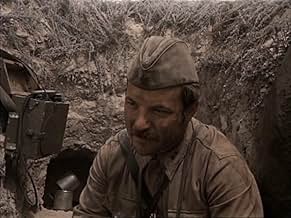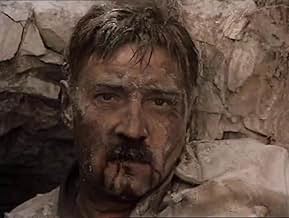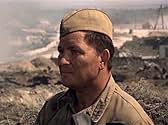Füge eine Handlung in deiner Sprache hinzuJuly 1942. Soviet forces are retreating in the face of a massive German onslaught towards Stalingrad. An infantry platoon is tasked with holding a vital hill in order to give their comrades ... Alles lesenJuly 1942. Soviet forces are retreating in the face of a massive German onslaught towards Stalingrad. An infantry platoon is tasked with holding a vital hill in order to give their comrades time to cross the Don River and regroup.July 1942. Soviet forces are retreating in the face of a massive German onslaught towards Stalingrad. An infantry platoon is tasked with holding a vital hill in order to give their comrades time to cross the Don River and regroup.
- Regie
- Drehbuch
- Hauptbesetzung
- Auszeichnungen
- 3 Nominierungen insgesamt
- Glikeriya
- (as Lidiya Fedoseeva)
Empfohlene Bewertungen
Screenplay and direction by Sergei Bondarchuk with Vasili Shukshin ( as Poitr Lopakhin ), Vyaheslav Tikhonov ( as Nikolay Strltsov ), Sergei Bondarchuk ( as Ivan Zvyagintsev ), Georgi Burkov ( as Alexandr Kopytovskij ), Nikolai Gubenko ( as the Lieutenant ), Yuri Nikulin ( as Nekrasov ), Ivan Lapikov ( as Poprischenko ) & Nonna Mordyukova ( as Natalya Stepanova ).
The film is based on the book by Nobel Prize winning author Mikhail Sholokhov. The action is set in Russia in July of 1942. The exhausted Soviet army was in full retreat against the might of the invading German Panzer divisions. A decision is to hold a ridge with what is left of an infantry regiment near a small village on the banks of the River Don, to allow the exhausted remnants of the army enough time to withdraw across the river and help fortify Stalingrad for the decisive battle that must come.
The loss of Russian life during the campaign was horrific and while there are some impressive set battle pieces, the film concentrates on the exploits of half a dozen or so soldiers from the shattered regiment, who must not retreat even in the face of the Panzers' greater fire power. The film depicts the thoughts and fears of the individual soldiers in the face of the impending battle, and their thoughts of their Mother Russia as well.
While the battles rage, the viewer is not only shown the inhumanity of the conflict, but also the strong personal bonds that develop between comrades in arms in a deadly conflict. There is also plenty of humor in the script, even if it is often grim and tinged with violent overtones. Vasili Shukshin ( as Poitr Lopakhin ) takes the acting honors, with a character that is as much larrikin as it is proletariat.
The film concentrates on a small number of individual regimental soldiers fighting within a larger battalion on the Russian Steppes in 1942. We are shown not noble soldiers and distinguished officers of the "glorious" Red Army, but ordinary fighting men. They are hungry, dirty, mentally and physically drained. Also, they are exhausted by their continuous 12 months retreat eastwards towards the river Donn and eventually Stalingrad. The soldiers find harmony in talking about home, family and express their emotions and feeling on the war and what it as done to them as people and their motherland. Location is presented impressively on film; firstly, by using wide angel lenses to capture the vast midst of the Steppe salt marches and corn fields. Secondly, by using close angel lenses to photograph the soldiers as they pass through, rest and interact with nervous civilians in the inhabited dwellings. With a large budget comes large battle scenes. The film shows the merciless destruction of land and villages by Luftwaffe air strikes. Defensive formations containing a whole battalion which is broad in scale and includes large battle formation shoots. The film doesn't over exaggerate when handling the destruction, human cost and horror of battle in its scenes.
The main depiction of war, battle and destruction are powerfully focused on individual soldiers. This film tells a similar story for many veteran soldiers of the second world war, whatever the nationality. Boredom, fatigue, fear, fun, friendship, enemies, orders, pain, loss, distress, death and a longing to go home.
They Fought For Their Motherland" tours the inferno imposed upon the soviet people, both military and civilian, on one side by the advancing, all concurring, disciplined German army. And on the other by years of hardship, personal sacrifice, poverty and living to the ideologist view of the soviet dictatorship. This is not the most graphic of war films in todays standard of brutal, realistic, fast passed combat movies. There are scenes of battle sustained injuries and death. However, this film focuses the humanity of war and what it does to the land, and the opinions of people in occupied nations towards the soldiers who are there to protect them. This is a patriotic film from a Russian point of view, which for many years, as at the time of release, future Russian generations, and other nations that fought in the red army, should look back with pride and honour towards those who fought, and died, for their motherland.
And Wow! I think you could write a novelette on what makes this a great film. There's just too much to say in a review, so I'll be general.
This war film is about Russians fighting against Germans in World War II. In ways, it is much like old American World War II films, with the spotlight on a small group of soldiers in one unit.
The director does so much that is superior that I can't even begin to start on his achievement here.
The film shows us the reality of war, including the "down time" in between conflicts, when soldiers peruse the low points.
Yet we are never bored, even when the action is supplanted by drama. The reason is that the script is so well written, and I must also congratulate whomever translated this into English for me, because its dialog would make any American film writer jealous.
One of the clever things our writer-director team does is keep the reality in the beginning by not letting us know who will survive, and who may be a central character.
Two characters dominate the story, a lady's man and a cook. However, the other characters are also spectacular.
What really makes this film work is the humor, a dark humor, but a realistic one, and one that will make you laugh and cry and the same time. When one old veteran tells the story of his trench disease, you'll laugh along with the other soldiers. It's one of those stories that is Hell when you live it, but hilarious when you tell it after the war.
For me, the magical part is something that I can't say without a spoiler.
The camera work is amazing. The drama is amazing. The theatrics is amazing. Okay, it's all amazing.
If that's not enough you have Nikulin, who was a war veteran himself, in one of his dramatic roles.
Wusstest du schon
- WissenswertesThis was the last film of Vasiliy Shukshin.
- PatzerDuring the first battle, a few of the Germans are carrying MP44 (or STG 44) assault rifles. This film takes place in summer 1942 and those rifles were not in service in the German army (even as prototypes) until over two years later.
- Zitate
Ivan Zvyagintsev: May our love towards our country live in our hearts as long as we live.
Ivan Zvyagintsev: May our hatred to enemy always shine on the tips of our bayonets...
- VerbindungenFeatured in Sergey Bondarchuk (1982)
Top-Auswahl
- How long is They Fought for Their Country?Powered by Alexa
Details
- Erscheinungsdatum
- Herkunftsland
- Sprache
- Auch bekannt als
- They Fought for Their Country
- Drehorte
- Produktionsfirmen
- Weitere beteiligte Unternehmen bei IMDbPro anzeigen
Zu dieser Seite beitragen






































